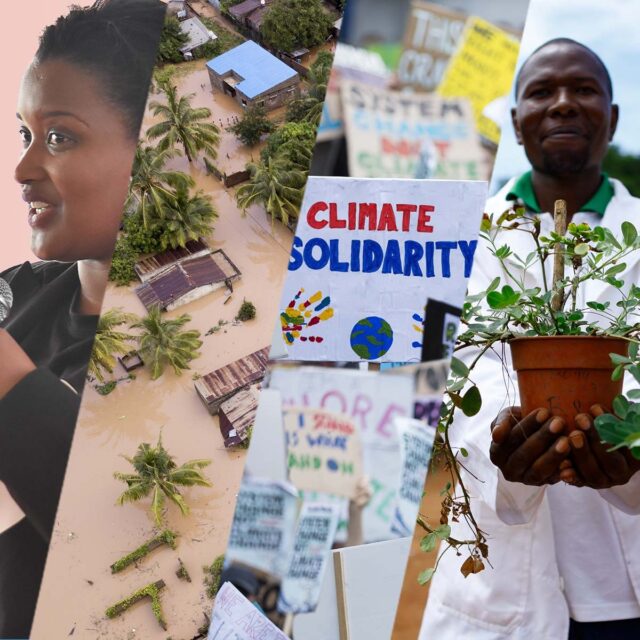As an organisation created to tackle extreme poverty and preventable disease, the past year has been a stark reminder to everyone at ONE just how important this mission is.
All around the world, we have seen how a single virus has brought chaos and fear — threatening people‘s lives and livelihoods and wreaking havoc on whole economies. As is so often the case, the poorest and most vulnerable have borne the brunt of this crisis; for them, an end to the pandemic still seems a frighteningly remote prospect. And it has set back efforts on the Sustainable Development Goals by years, maybe even decades. 100 million more people are suffering from extreme poverty, tens of millions of children have not been able to learn at school and testing and treatments against HIV/AIDS, tuberculosis, and malaria have been dangerously disrupted.
But another massive obstacle stands in the way of ONE‘s mission. The accelerating climate crisis will leave no community unaffected and will shape the world for future generations. Again, the people most exposed to this threat are those in the world‘s poorest and most fragile countries, where the climate crisis presents a threat not just to lifestyles, but to life itself. Areas at risk of food shortages, drought, and famine face an increasingly perilous future. People and communities that depend on agriculture and the natural environment face major risks to their income and livelihoods.
Increasing competition for vital natural resources will place further strains on fragile countries. Governments that are already struggling to provide essential services to their citizens will face even greater financial pressures, as the world confronts the economic consequences of climate change. No area of our lives will go untouched. The threat to our climate is also a threat to global health, to global security, to our development and future prosperity and a threat to people‘s rights and freedoms.
It is hard to ignore the grave injustice that sits at the heart of this, given that poor and vulnerable people have contributed the least to climate change. Responding to these threats and providing lower income countries with the means to embrace sustainable growth and development will be integral to eliminating extreme poverty and eradicating preventable disease. While the pandemic has been the biggest global challenge in a generation, without urgent action, climate change could yet become the biggest challenge faced by any generation.
As the world faces up to climate change, those most affected must have a full and equal voice developing the solutions. As we‘ve learned from the past year, we cannot afford to leave countries — or indeed whole continents — behind when rebuilding from crises and embracing new technologies.
Ultimately the only path out of this global crisis is a 7.5 billion-person strategy — driven not only by heads of governments or large corporations but also by the farmers in the Sahel whose crops don‘t get any rain, by the fishermen in Ghana whose catches have halved, by the families in Mozambique who have lost their homes to floods and cyclones. We need to ensure these people aren‘t just heard, but actively listened to.
This isn‘t simply a question of justice. It‘s also plain common sense. A crisis that threatens the whole of humanity demands a response that involves the whole of humanity. No solutions will be effective if they aren‘t designed with the whole world in mind, and delivered through unprecedented partnership and collaboration between all countries, communities, and companies.
Nowhere is this more true than in Africa, which now sits on the frontline of the worst consequences of climate change. Africa has a vital role to play in the global response. It has untapped potential to harness renewable energy, develop sustainable technology, and be at the forefront of the green industrial revolution. Investing in these areas will “green” jobs, which are desperately needed throughout the continent. Perhaps most fundamentally, successfully tackling climate change and its impacts on vulnerable people is dependent on the capacity of every country to make the transition to new and greener technologies. How each country deals with the challenge of meeting their current needs, must become the concern of all.
If we learn the lessons of the past, we can forge a new era of global cooperation in which all countries are equal partners. But if we continue to get this wrong, not only will we face a spiralling climate crisis, but also a further era in which the most vulnerable communities are trapped in an inescapable cycle of debt and dependency. A world free from poverty, injustice, and preventable disease is a tantalizing prospect — but it risks becoming ever more remote if we don‘t rise to this challenge. We owe it to future generations everywhere to get this right.
At ONE we look forward to working with all our supporters and partners to make sure that our own generation makes the right choice.
